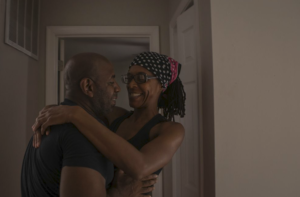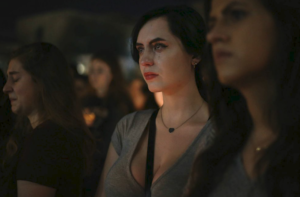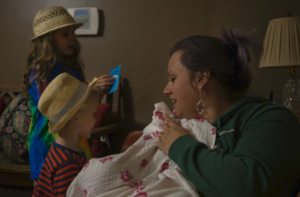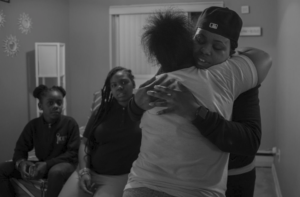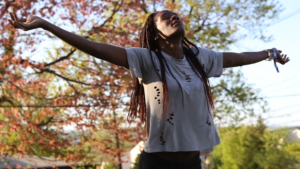
Hadley Chittum
Hadley Chittum, an undergraduate from George Washington University, won the James Brown and Frank Folwell scholarship.
Accomplishments
This fall, one of my photos was selected for Women Photojournalists of Washington’s annual juried exhibition, judged by prominent female photo editors and photographers. It was an honor to have my work exhibited alongside so many badass women visual journalists, like Amy Toensing and Carol Guzy, whose work inspires me to pursue my passion of photojournalism.
A photo I took earned 3rd place in Associated Collegiate Press’ Spot News Photo in 2018. Last Spring I was recognized by my college as Corcoran sophomore student of the year.
In addition to my awards awards, I’ve worked throughout college as a staff photographer of my college paper, the GW Hatchet, while holding part time jobs as a full time student, maintaining my 3. 7 GPA and pursuing personal photo projects outside of school.
As another testament to my work ethic, I lived in Richmond, Virginia this past summer, completing two part time internships at Richmond Magazine and RVA Mag while also working another part time food service job to pay my rent.
Currently, I work at Investigative Reporting Workshop as a photo/video intern where I help create visuals for longform investigative projects. This position has opened me up to opportunities like assisting the DC PBS Frontline team on shoots. In mid-December I’ll be flying down to Florida to photograph for an investigative story on Florida’s water quality.
Career Goals
As I continue to document stories relating to incarceration in DC, I never stop hearing of new experiences from those who have spent time behind bars or have lost family members to the system. I’ve realized there will never be a shortage of these stories thanks to the overwhelming number of institutionalized people in our country. Because of this, I’m committed to documenting stories relating to the criminal justice system. In particular, I’m interested in photographing the trauma-to-prison pipeline that primarily affects young girls of color.
I see a need to focus on positive stories that may offer a solution to some of the problems caused by incarceration. While I wouldn’t want to portray these issues as trivial and easy to overcome, it is my goal to show how people have grown or learned to cope with their past crimes or experiences.
The Marshall Project’s visual work serves as a huge inspiration to me and I could see myself working for them in the future. Currently, I intern in a non-profit newsroom where I’ve realized it’s a type of journalism I want to pursue further. I appreciate the patience and ability to invest in more long term projects in comparison to daily news companies that constantly work to break news.
I’m still very early in my career and still figuring out what type of photojournalist I want to be. I find myself simultaneously being pulled between journalism and fine art photography. Because of this and my desire to experiment in my visual storytelling practice, my main career goal is a bit abstract. While I know I personally hold a great deal of empathy, I want to ensure it is always translated through my work to viewers.
The most important thing for me as a photojournalist is to maintain my natural curiosity and desire to improve the lives of others, for that is what inspired me to take on this career in the first place.
Portfolio
Click on pictures to see stories.
Lashonia and Sean
Over the past few months, I have started a photo project documenting the relationship and lives of Lashonia and Sean Thompson-El. Their relationship feels like young love, both so enamored with each other, despite their ages, 47 and 55, and their criminal records. Both Lashonia and Sean have been convicted of murder. Lashonia spent nineteen years in prison for a crime she committed when she was nineteen. Sean spent 28 years incarcerated for murder and drug charges when he was seventeen. They both describe their younger selves as menaces, always looking for a fight. Defying the odds, both have managed to earn bachelor’s degrees and in the case of Sean, even a masters degree. Lashonia and Sean are well known throughout the Southeast community for their restorative justice work and gun-violence prevention.
This project is still in its early stages but I wanted to show my progress so far. I want to intimately depict their loving relationship and the important work they do for their causes they have been most affected by. Though they have both taken lives, they are actively working to prevent others from making the same violent mistakes they made. My intention is for people to empathize with Lashonia and Sean and see the value they contribute to society.
Singles
Singles, unrelated photographs.
Just a Normal Mother
Allison Whaley is a teacher, bowling coach, youth leader, wife and mother of seven children. She has purple hair and three master’s degrees and loves ’90s rap.
But to her, she’s just a normal mother.
The Whaley family begins every day at 6 a.m. in their home in Jeffersonville or, as they call it, “the real country.” Allison wakes the other eight members of her family, and, if she has time, she makes breakfast for everyone.
Allison describes mornings as an “everyone for themselves,” situation. If her girls get ready in time, she braids their hair while her husband, Jason, changes the youngest two’s diapers.
Allison met Jason while attending Montgomery County High School where she now teaches. Jason was attending Morehead State University, and after Allison graduated, she followed. While they were both undergraduates, Allison got pregnant. Their oldest, Jacey, was born 16 years ago while the couple were still in school and working. They married in 2002 during their college spring break.
Three years later Jaxon was born, then Macy, Keightley, Marlowe, Nixon and WillaGrey, who’s 10 months old. While increasing her family, Allison graduated with a bachelor’s degree and has completed three master’s degrees from Morehead State.
“I didn’t just want to be a statistic or just another teen mom,” Allison says. “I wanted to show my daughters that I didn’t just quit after having a kid.”
After she earned her second master’s degree, she applied for a job as an assistant principal. During the interview, she says she was told, “You have five kids at home that need you.”
“That really broke me,” she says.
In addition to the usual Whaley family chaos, 2017 brought serious hardships.
Last October, Nixon became deathly ill with a ruptured appendix. At first Nixon’s illness was misdiagnosed and his condition worsened. Nixon spent six months in and out of the hospital. Allison, who was pregnant and gave birth to her youngest while Nixon was ill, slept in the hospital bed with Nixon and then with both her ill child and her newborn while Jason was at home managing the rest of the family.
They took another blow when Allison’s grandmother collapsed and died suddenly. Allison is still dealing with grief.
“Do you ever feel like someone has to die for someone else to live?” she says.
Soon after Nixon recovered, Allison resumed her usual duties as a teacher, coach and mentor. She never stopped being a mom.
“Sometimes I feel like I do so much I half-ass everything,” she says.
Although she’s often pulled in dozens of different directions, Allison wouldn’t have it any other way.
“It’s a crazy life, but it’s our life. I love it.”
Reentered
“Black women are the backbone of our community,” was one of the first things Lashonia, director of the WIRE DC, said to me when explaining the importance of the organization. The WIRE, which stands for “Women Involved in Reentry Efforts”, is made up of formerly incarcerated women that provide aid to other womencoming out of the prison system. Black women are imprisoned at a growing rate and often leave behind their children and families. When they’re released, options for jobs and housing are limited, making it easier to fall back into the prison system.
The founders of the WIRE have created a safe space for women just like themselves to heal fromlingering traumas and move on from their past. For the women of the WIRE, restorative justice is not just ahobby or a career, it has become their life. “We will be working as long as work needs to be done,” Lashonia says.
These portraits highlight just five of the women who have beaten the odds of recidivism and the stigma of incarceration: Lashonia, Brittney, Charnal, Tanisha, and Aaliyah. The additional photos show the women in action: speaking at memorials, hosting award ceremonies, panels, and healing together through yoga and group therapy.
With the help of these women, I hope to continue this project, highlighting and honoring their work and the many struggles inherent to incarceration.
Strong and Capable
Growing up with her mother in prison and an abusive step-parent, Charnal experienced multiple childhood traumas. It wasn’t until she was an adult that she finally began confronting her feelings of loneliness and anger. Now, she uses the power of meditation and yoga to heal from her past. This June she will begin her yoga certification so she can help others in her community find peace within themselves.
*Charnal has since completed her certification and continues to practice trauma-informed meditation and yoga techniques to others in her community of Southeast DC.
Project role: Filmed and edited by me

